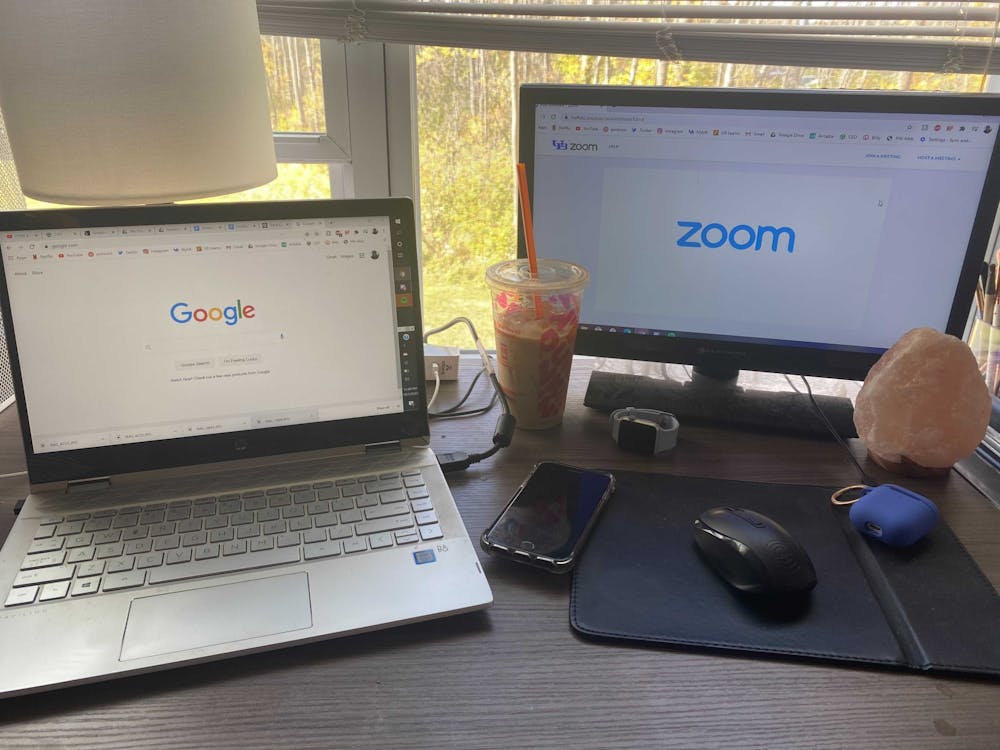Are students thriving or just barely surviving in their online classes?
Turns out, it depends who you ask.
Almost every student at UB is taking at least one online class this semester. This includes students who have taken online classes before and many who have never taken an online class and never planned to. Online classes are difficult for a number of reasons and provide challenges that students might otherwise not have faced. With a few weeks of the semester under their belts, plenty of students are still trying to figure out how to adjust to digital learning.
With multiple formats for online classes, students are experiencing both shared and unique challenges.
Some students said their classes are well-organized. Over the summer, as students eagerly awaited a comprehensive plan for the fall semester, professors were hard at work updating syllabi, arranging virtual office hours and coming up with class schedules.
Le Cao, a senior business administration major, is pleased with the work his professors put in to prepare students for the fall semester.
“My online classes seem really well organized,” Cao said. “My teachers are able to keep everybody up to date on assignments and upcoming exams, which is really nice.”
Although many students expressed that hybrid learning is not ideal, some students have taken comfort in how easy-to-navigate UBLearns is.
But others expressed reservations about remote learning.
Students have voiced their concerns about potential distractions — problems with home life, inconsiderate roommates and addictive technologies — derailing their experience. For many who have never taken an online class over the course of a full semester before, the fall has been as much about learning new material as it is relearning how to study and interact with their peers in a new way.
Across the country, students have reported elevated levels of stress and loneliness. According to an article on Evolllution, some groups like males, ethnic minorities and those with lower GPAs, have been less likely to succeed in remote environments.
Monica Adam, a sophomore history major, said that it has been challenging to stay focused while completing her online coursework.
“I’m naturally someone who is easily distracted,” Adam said, “and now that my professors can’t see what I’m doing, it’s almost impossible for me to not go on my phone during class.”
Many students mentioned being distracted by social media, such as Facebook, Instagram, Snapchat or Twitter. During a live, in-person lecture, students already struggle to maintain focus. During an asynchronous class — classes that don’t take place at a set time, — it is much more difficult.
Eric Alcalde, a sophomore linguistics major, said that his struggles extend to more than just distractions.
“I like the idea of having online classes, but not more than two, maybe three,” Alcalde said, “I’m taking 18 credits online and it has proven to be very stressful. Having so many online classes is challenging, because it becomes very overwhelming since the work starts to pile up.”
Returning students are accustomed to structure: waking up in the morning, attending in-person lectures during the day, coming back to their dorms/apartments at night. But students who are taking predominantly asynchronous classes can feel overwhelmed by having to create their own schedule.
In the absence of hard deadlines, attendance policies or concrete schedules, students have to figure out how to juggle their commitments on their own.
Abby Kolstee, a sophomore biomedical sciences major and Spectrum staff writer, said that making friends in classes and finding study partners has become more difficult.
“It’s honestly challenging,” Kolstee said. “I feed off of other people so being alone in my room has been tough. Last year I was able to make friends so easily by just sitting somewhere new each class, but I can’t do that now.”
While schools have worked hard to create classes that flow smoothly online, Kolstee makes a key point: The social aspect of college has practically disappeared for students. It seems that schools aren’t doing anything to facilitate study groups or social interaction, which is an important part of the college experience.
The features desk can be reached at features@ubspectrum.com





